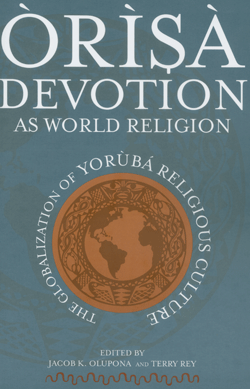Traditional African religion attracts global devotees
Religion professor Terry Rey explores the globalization of Yorùbá religious culture
|
An ancient spiritual tradition that originated among the Yorùbá people of West Africa has taken root in the hearts and minds of individuals all over the globe. Brought to the Americas as a result of the trans-Atlantic slave trade, Orisa devotion and the varied traditions it encompasses are prominent in North America, the Caribbean, Brazil and Cuba. |
 Photo by Joseph V. Labolito/Temple University
Religion professor Terry Rey, co-editor, of Orisa Devotion as World Religion: The Globalization of Yorùbá Religious Culture, estimates that there are nearly 10 million people across the globe who practice an ancient West African spiritual tradition.
|
“In the ’80s, historian Sandra Barnes estimated that there were 80 million people in the world devoted to the Orisa — that was 20 years ago. Based on the growth of the tradition, I don’t think it’s a stretch to say that there are at least 100 million practitioners worldwide,” said Terry Rey, an associate professor of religion. While teaching at Florida International University in Miami, Rey and his colleagues organized a forum to discuss Orisa devotion in the New World. The result of the conference, which brought together several scholars, artists and Orisa practitioners, was a collection of essays edited by Rey and Professor Jacob K. Olupona of Harvard University titled Orisa Devotion as World Religion: The Globalization of Yorùbá Religious Culture. |
||
|
Penned by conference presenters, the book explores the emergence of Orisa devotion as a world religion. “Shaped by the trans-Atlantic slave trade, Christianity, Islam, colonialism and now globalization, Yorùbá religious culture remains dynamic and inspirational,” said Mojúbàolú Olúfúnké Okome, associate professor of political science at Brooklyn College. “This volume goes beyond the usual tendency in diaspora studies to focus on cultural retention. It is a significant contribution.” |
|||
|
|||
